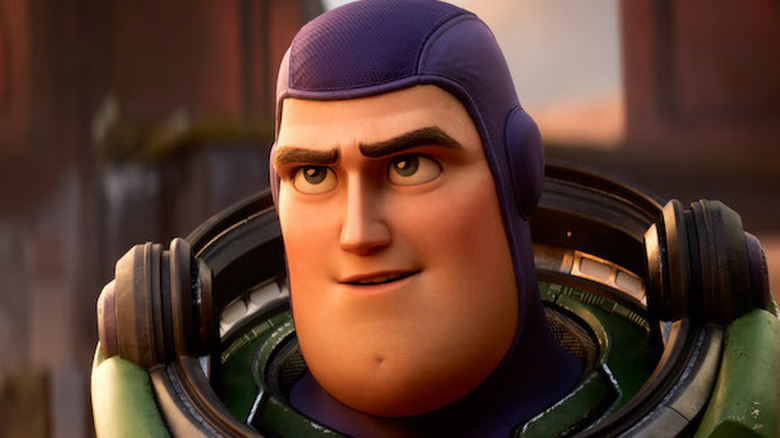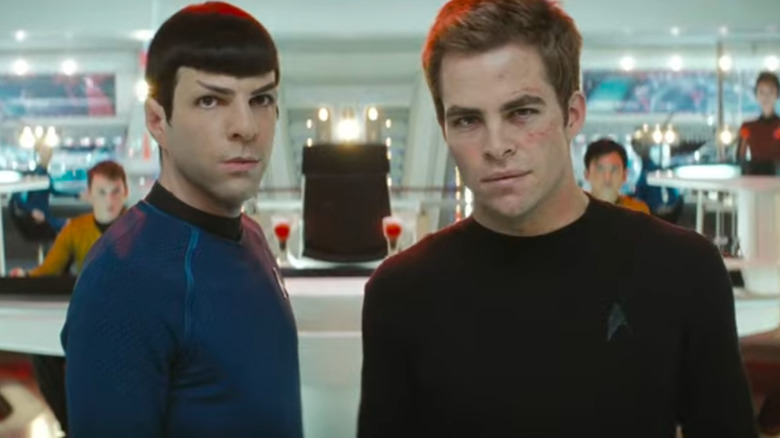Lightyear's Michael Giacchino Shares His Approach To Composing Movie Scores - Exclusive
Talking to Michael Giacchino — the composer behind iconic movie and TV scores including "The Batman," "Spider-Man: Homecoming," and 2009's "Star Trek" reboot — feels a little like attending a master class on making music for the screen. Giacchino clearly feels passionate about his work, and he brings that passion to each film and TV show he lends his talents to. That's led to some of the most memorable musical moments in recent TV and film history, from the hushed piano theme that breaks hearts in "Lost" to the instrumental punctuation that helps illustrate how Remy (Patton Oswalt) the rat experiences food in "Ratatouille" to the jaunty melody that sets the mood for Carl's (Ed Asner) story in "Up."
For Pixar's "Lightyear," Giacchino has once again created a score that perfectly captures the spirit of the movie, which tells the origin story of Buzz Lightyear (Chris Evans), whose toy version was introduced decades ago in "Toy Story." The version of the character in "Lightyear" is a noble, heroic Space Ranger on a mission to find a way home after he and his crew are stranded on a hostile planet, and Giacchino's soul-stirring music underlines the film's action, adventure, and heart while also helping to sum up who Buzz is and the lengths he'll go to fulfill goals.
In a conversation with Looper, Giacchino described how he approaches each movie and TV project to ensure the music he composes captures the characters' journeys and enhances the story.
For Giacchino, it all comes back to character
Whether he's crafting the musical backdrop for a family-oriented animated film or an action-packed drama, Michael Giacchino said he begins with the same understanding of story and character. "The way you got to look at it is: Remy [from 'Ratatouille'] is a rat who cooks. Yes, that is not real. It's a real character that was created, but it's not real. Captain Kirk [of 'Star Trek'] is the commander of the Starship Enterprise. He is not real either," Giacchino explained. "You're working with stories and characters, and it doesn't matter if it's a live action or an animated thing. The process is the same. I treat them all the same. I treat them as equals."
He noted that treating characters as if they are real people is a way to show his respect for them, the TV or movie they're featured in, and the audience watching. "I treat Remy as a real person, and as much as I will dig into Captain Kirk's trauma of growing up and all of this to understand who he is as a person, I will do the same with Remy," Giacchino stated. "I will do the same with Buzz. I will do the same with Carl and Ellie [from 'Up']. I will do the same with Caesar from 'Planet of the Apes.' They are all, in my mind, real people that exist and I treat them with that sort of respect."
"The worst thing you can do is go into a job scoring a cartoon and say, 'Oh, it's a cartoon, so I'll score it like a cartoon,'" Giacchino continued. "No, that is the absolute worst thing you could do, because then you're undercutting the reality of these characters and the emotionality of these characters and what they're trying to say and what they're trying to do with the story. That will completely ruin the whole thing. My approach has always been to treat them as real people, every one of them, because guess what? None of them are real on any side of it. It's all like reading a book and these characters coming to life, bringing them to life in the most respectful way you can."
"Lightyear" is currently playing in theaters.

